As RVers, nothing can hold us back. We travel across the entire country making countless stops along the way. But do you know what’s in the water you’re drinking in all these different places? Probably not. That’s why it’s so important to have an RV water filter, to help keep you safe on the road.
But it’s not just about keeping you safe. Adding a filter to your RV is a great way to cut down on buying plastic water bottles. This will save you time and money in addition to the fact that it’s so much better for the environment.
What is an RV Water Filter?
The purpose of an RV water filter is to filter the water you use while camping. Various types of filters provide differing levels of filtration. The good news about all RV water filters is that they’re small and compact so they make a perfect addition to your rig. This simple device can go a long way towards keeping you and your family safe.
Why Do You Need an RV Water Filter?
First, there are places you’ll travel to, even in North America, where the municipal water supplies are not safe to drink. Drinking contaminated water is a huge health risk. Even if the water is supposedly cleaned, it may have been processed with harsh chemicals like chlorine that you’d rather not drink.
Another reason to filter your water is that your freshwater tanks may not be the cleanest. We understand that it’s easy to slack on cleaning out your tanks. But whatever yucky things are growing in there are contaminating your drinking water while they’re at it. We recommend cleaning your freshwater tanks to avoid this (check out our post about that). But adding a water filter to your RV offers you added peace of mind.
Types of RV Water Filters
There are a few different RV water filtration options. Let’s review the most common types of water filters to help you to make your final decision:
Inline Filters
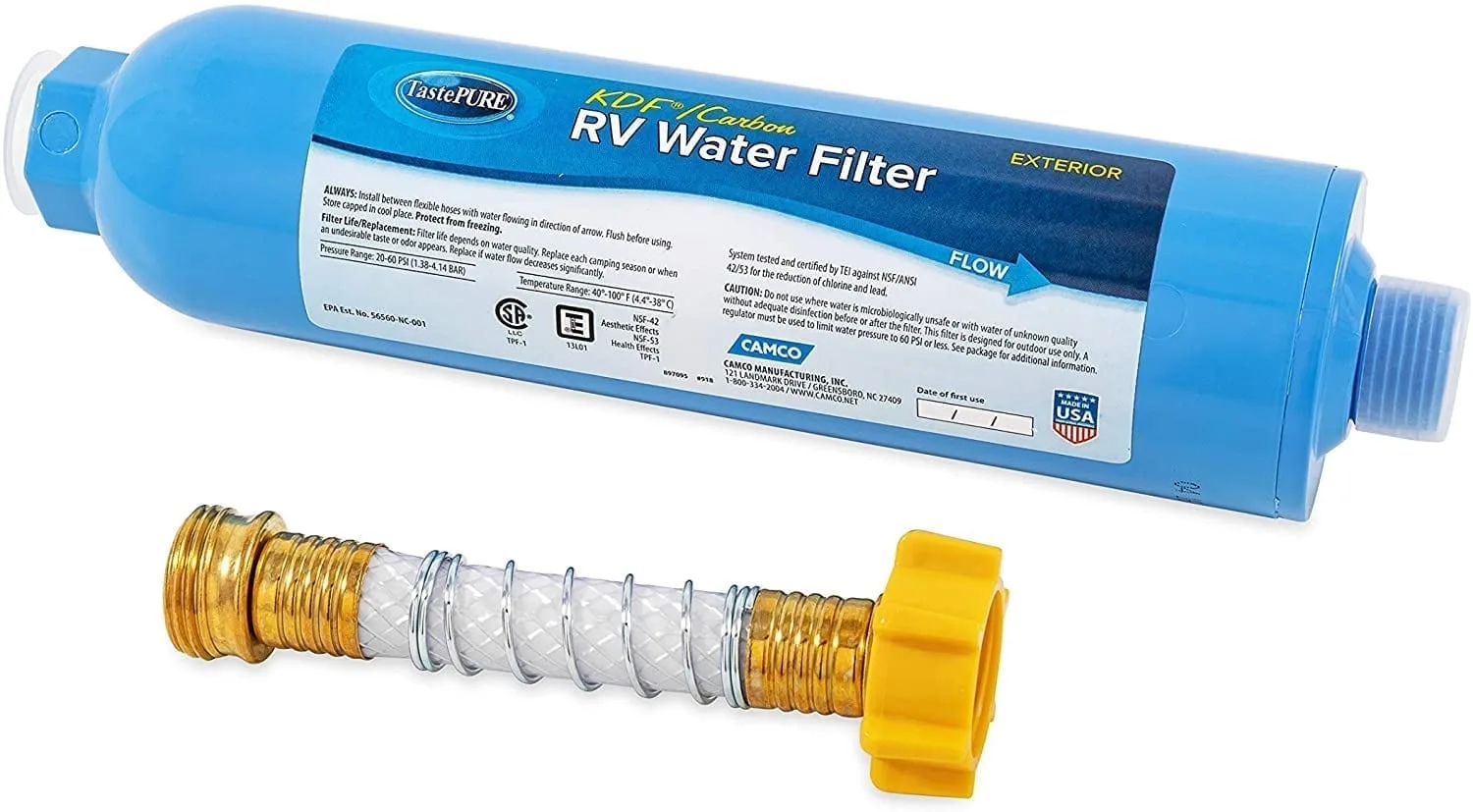
Inline water filters are a simple filtration option
An inline RV water filter is simple and effective. The best part is that it requires virtually no installation or upkeep. All you need to do is screw it on to your external drinking hose, and you’re good to go. The inline filter (like this one: https://amzn.to/358NJSo ) provides filtration for all the water coming into your RV. This is great, because then you know you’re using clean water for showering, brushing your teeth, cleaning your dishes, and so on. After using it for the recommended time, you’ll just toss it out and replace it with a new one. Inline filters for your RV are a great, simple option if you don’t use your RV all that often, but still want to make sure that you’re keeping your water clean.
Canister Filters
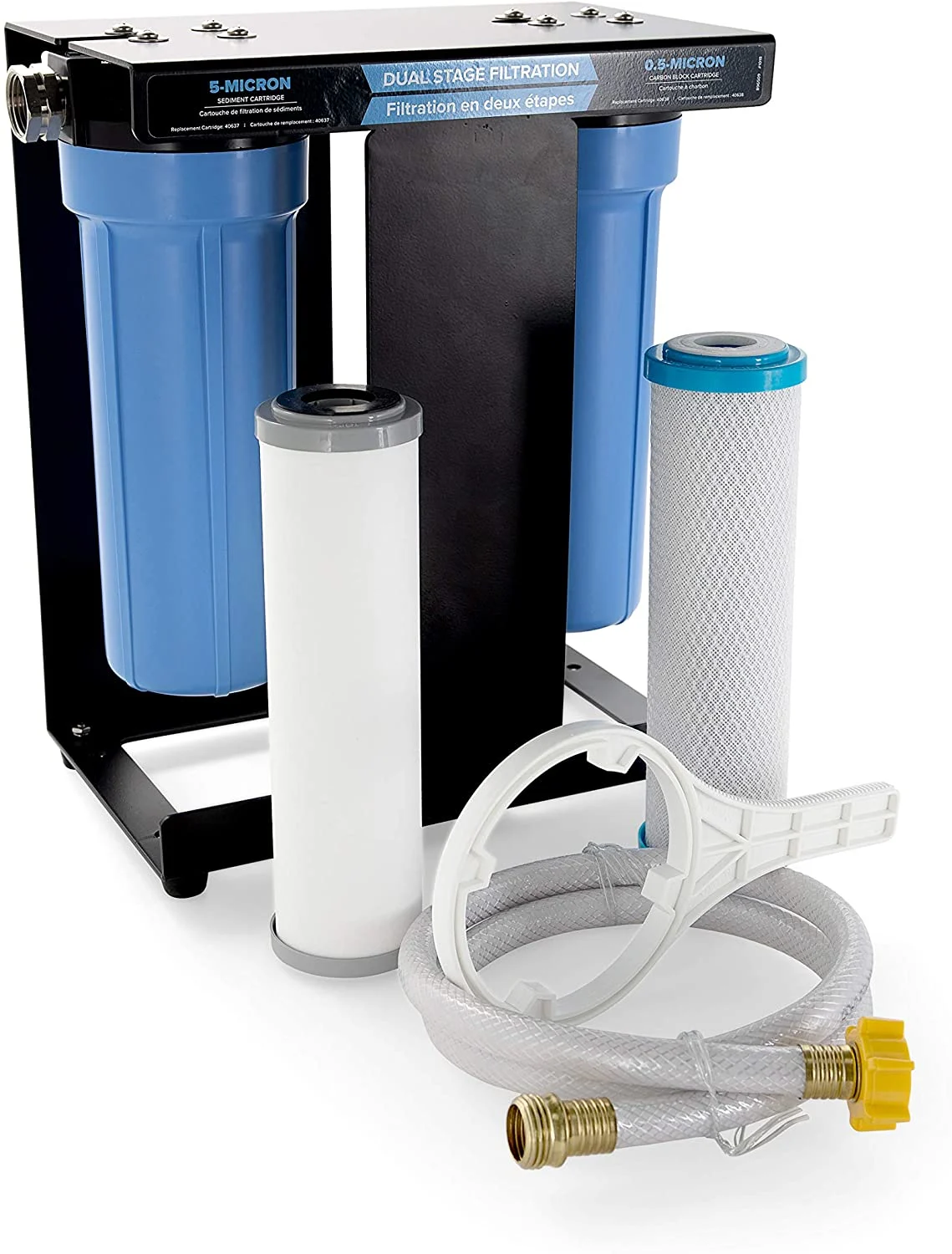
Canister filters provide additional levels of filtration
Another option for filtering water is a canister system. These systems provide more levels of filtration than an inline filter. You can get single, double or even triple-canister systems to filter out sediment, chemicals, bacteria, and more.
A canister RV water filter (like this one: https://amzn.to/2MnmLQf ) is also easy to install and use. You can get self-contained versions that simply attach to your external hose (very much like the smaller, inline filters), and then have a stand you can stick into the ground at your RV site. Or you can have them permanently installed in your RV (which is the way our RV came from the factory). Whichever option you choose, once installed, the canisters do the rest.
Point-of-use Filters
Either of the options above are great for filtering all of the water that enters your RV, which makes sure that even the water going into your RV’s fresh water tank has been filtered. At a minimum, you want to use those options to remove sediment and other impurities from the water, so you don’t gum up or damage your RV’s water pump or water lines. But if you use those filters to remove chemicals from the incoming water, it means you’re also removing the chlorine that was added to the municipal water supply to keep it safe to drink. And doing that can increase the likelihood that your fresh water tank will allow bacteria and other contaminants to flourish (you’re now storing non-chlorinated water in a large, dark container… surely nothing can go wrong with that, right?! ?).
Then, when you’re dry camping and need to use the water from your tank, it may not be safe to drink. Sanitizing your tank on a regular basis can help (and you should already be doing that), but it can’t protect you completely. That’s where point-of-use filters come into play. There are a whole range of options available here:
- A self-contained pitcher that filters the water you fill it with (like a Brita or PUR filter)
- A faucet-mounted filter you can turn on/off as needed to filter a glass of drinking water
- Under-counter filters that supply a dedicated countertop dispenser (like this one)
Since you’re using these water filters right before you intend to drink the water, it doesn’t matter if it’s city water… or water from your fresh tank… the filter is removing everything you don’t want. But only at the point you most need it to… when you’re ready to drink/use it.
Beyond RV Water Filters: Sanitizing With UV Light Purification
Last up, and arguably the safest way to ensure that your (now) filtered RV water is safe to drink, is a UV purification system. These devices use ultraviolet radiation to completely destroy bacteria, viruses, and cysts (OK, they eliminate 99.9999% of these, but we count that as complete destruction in our book, since at that level there isn’t enough of any of those contaminants left to do you any harm!).
UV purification systems provide safe on-demand water and last for a long time. They typically require installing the system underneath your RV sink which may take a little more work to install than other water filtration systems, but we think the initial setup is well worth the long-term benefits!
Our Favorite UV Purification System: Acuva
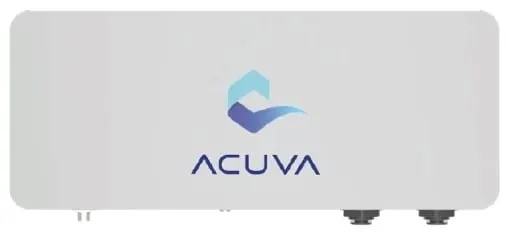
In our opinion, the best option for making sure that your drinking water is safe is the Acuva UV LED water purification system. First, it uses an inline filter to remove many common contaminants from the water, just like other under-counter filters. Once filtered, though, the Acuva system uses the same technology (UV light) that many major municipalities use to purify their water, so you know it’s safe and effective. And because they’re using low-power LEDs, it works perfectly with your RV’s electrical system. The entire unit is made using high-quality materials, so it will last for years.
The Acuva System includes all the parts needed for installation. All you’ll need are some tools including a drill, wrenches, a level, a tool for cutting plastic tubing, a pencil, and some zip ties.
Watch our video on how we installed an Acuva UV LED water purification system in our RV:
You have the option of ordering the Acuva water system with it’s own dedicated, separate faucet for drinking water, however with the latest model, the Eco NX-Silver, you can plumb it inline with an existing dispenser/faucet. No matter which route you take, you can be comfortable knowing that your RV’s drinking water is clean. They designed this system with RVers in mind, as it’s small and compact enough to fit into even the smallest of RVs. And it uses very little power, so it won’t drain your RV’s batteries.
Ditch the bottled water! Major cities sanitize their drinking water using ultraviolet light, and now you can, too. Acuva’s UV-LED system makes water safe to drink, using a fraction of the space...Show More
Ditch the bottled water! Major cities sanitize their drinking water using ultraviolet light, and now you can, too. Acuva’s UV-LED system makes water safe to drink, using a fraction of the space and power… perfect for RVs.
Check out our Acuva installation video here
Get 10% off any Acuva system when shopping online at Acuva's website and using the discount code listed here.
Show LessCurious about how effective the Acuva system is? So were we! So we put one to the test, using a raw sample from an unclean source AND an intentionally (and excessively) contaminated sample! Watch the video:
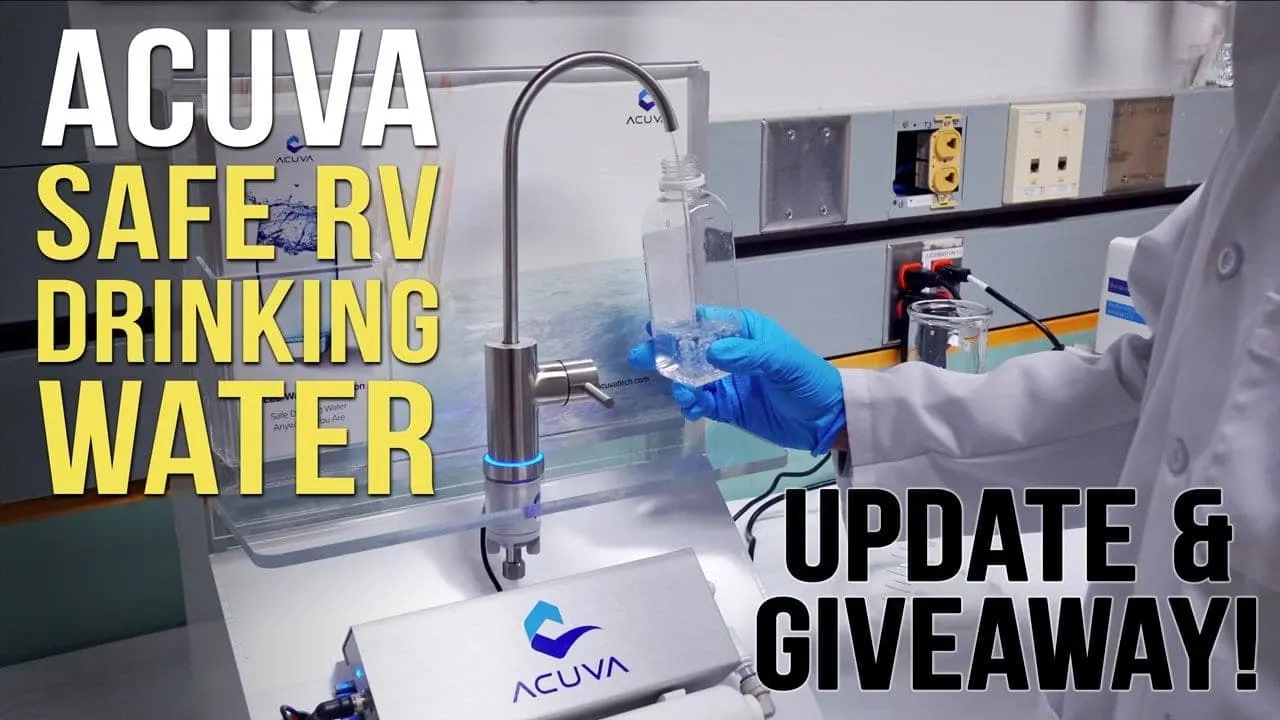
Click on the photo to watch the video of our extensive testing of the Acuva water purification system
RV Water Filters are a Must-Have for RV Life
When you’re on the road, you may feel reasonably nervous about drinking the water in your RV, whether it’s the local water from a city hookup or the water from your own onboard fresh tank. Rather than spend tons of money on plastic water bottles that may end up in a landfill, there’s a better option. Installing an RV water filter and/or water purification system is a simple addition to your RV that will have you feeling better about what you’re putting into your body, and keep you out enjoying your RV!
Geek Out With Us Every Week
Join our newsletter to learn about all things RV related. Every week we offer free tips, tricks, product reviews, and more to our online community of RVers. Whether this is your first time on the road, or you’re a seasoned expert, we’d love for you to geek out with us!


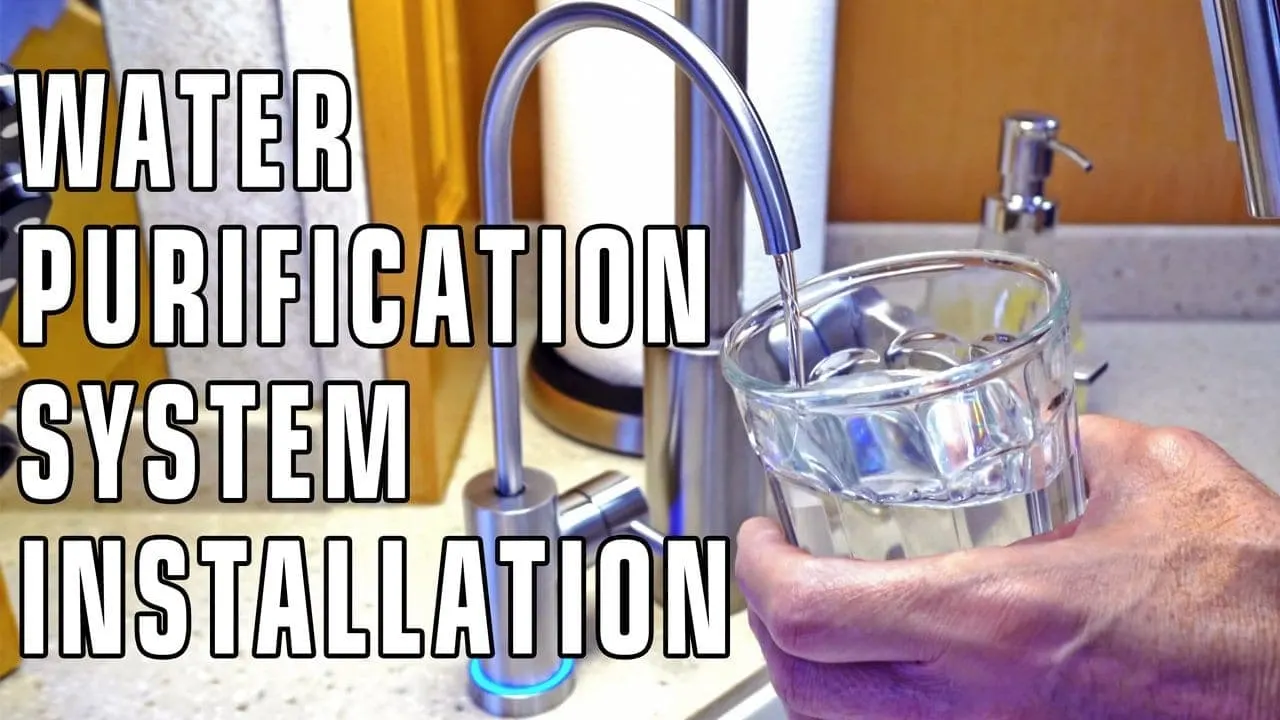
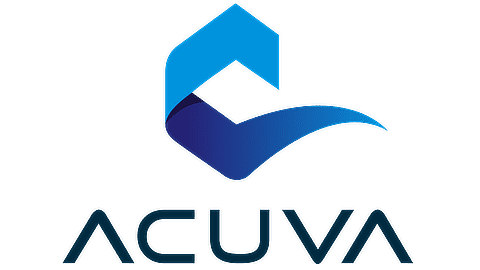
Jeff Parcel
Tuesday 3rd of January 2023
If you connect 2 filters in line will they work better than jus one filter?
TheRVgeeks
Tuesday 3rd of January 2023
Hi Jeff... there are systems that use multiple filters inline with one another, like for feeding a reverse osmosis system. But if you just take two identical filters and put them inline with one another, you'll likely only reduce the flow rate. But they won't filter down any further than they're able. So if they're both 5-micron filters, the output water will still have impurities smaller than that.